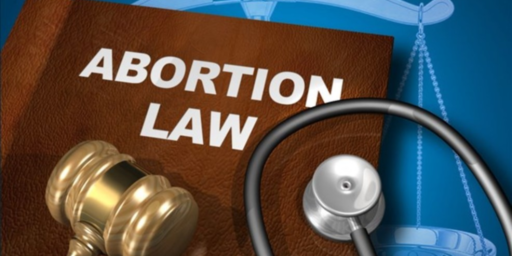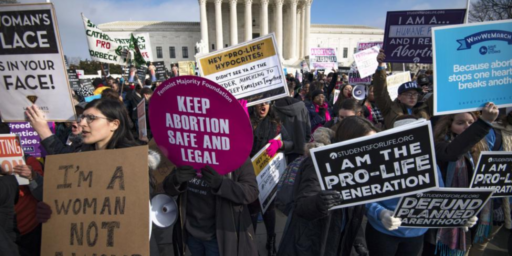Federal Judge Strikes Down Mississippi Law Barring Abortion After 15 Weeks
A Mississippi law that seeks to ban most abortions after 15 weeks was struck down by a Federal District Court Judge.

A Federal District Court Judge in Mississippi has issued an injunction barring enforcement of that state’s restrictive law barring abortions after fifteen weeks:
ATLANTA — In an often-biting opinion, a federal judge on Tuesday blocked a Mississippi law that sought to forbid most abortions after 15 weeks of pregnancy.
Judge Carlton W. Reeves of Federal District Court in Jackson, the Mississippi capital, wrote that the law “disregards” the 14th Amendment’s promise of due process and defied the United States Supreme Court’s existing precedents on abortion rights.
“The state chose to pass a law it knew was unconstitutional to endorse a decades-long campaign, fueled by national interest groups, to ask the Supreme Court to overturn Roe v. Wade,” the judge wrote. “This court follows the commands of the Supreme Court and the dictates of the United States Constitution, rather than the disingenuous calculations of the Mississippi Legislature.”
He added, in a footnote, that the Legislature’s “professed interest in ‘women’s health’ is pure gaslighting” and that Mississippi officials challenge abortion rights but “choose not to lift a finger to address the tragedies lurking on the other side of the delivery room: our alarming infant and maternal mortality rates.”
Judge Reeves, who cited evidence that viability begins at between 23 and 24 weeks, issued his decision about eight months after the Republican-dominated Mississippi state government enacted the law, which banned abortions if “the probable gestational age of the unborn human” was determined to be more than 15 weeks. The statute included narrow exceptions for medical emergencies or “a severe fetal abnormality.”
The law drew a same-day court challenge by the Jackson Women’s Health Organization, the state’s only provider of abortion services, and Judge Reeves responded almost as quickly with an order that barred the law from being enforced. It was not until Tuesday, though, that he issued a permanent injunction and described the law as “a facially unconstitutional ban on abortions prior to viability.”
But Judge Reeves, who was appointed to the bench by President Barack Obama, said the law may have been the foundation of a “deliberate effort” by Mississippi politicians to overturn Roe v. Wade, which recognized a nationwide right to an abortion.
“With the recent changes in the membership of the Supreme Court, it may be that the state believes divine providence covered the Capitol when it passed this legislation,” Judge Reeves wrote. “Time will tell. If overturning Roe is the state’s desired result, the state will have to seek that relief from a higher court. For now, the United States Supreme Court has spoken.”
This move comes roughly eight months after Mississippi passed what was clearly one of the most restrictive laws regulating abortion rights since the Supreme Court handed down its decision in Roe v. Wade forty-five years ago. Previously, most states had tried to ban or severely restrict abortion rights at roughly the 20th week of pregnancy, or roughly around the same time that a fetal heartbeat could be detected. Each of these laws was eventually struck down by the Federal Courts, as were other efforts to attack abortion rights such as the law passed by Texas purporting to regulate abortion clinics in the same manner they do hospitals and other medical facilities, the result of which was to effectively shut down most of the clinics in the state. This law was eventually struck down by the U.S. Supreme Court in a 2016 decision that reaffirmed both Roe and Planned Parenthood v. Casey, the 1989 case that had been the most recent challenge to the central holding in Roe. As it stands, none of the cases dealing with the 20-week ban or the fetal heartbeat issue have made their way to the Supreme Court. In any case, the Mississippi was immediately challenged and a Judge issued an injunction was put in place barring enforcement of the law pending resolution of the case. That is the case that is the subject of this week’s ruling.
The Texas ruling in 2016 is significant precisely because it reaffirmed not only the decision in Casey but also the central logic of Roe itself and the question of when and how the state can restrict a woman’s ability to have access to an abortion. This arguably sends the signal that the forty-three-year-old precedent in Roe is unlikely to be kicked to the curb by this Court or, depending on the election results, any Court in the foreseeable future. Indeed, thanks to concepts such as stare decisis the longer Roe remains good law the less likely it is that the Court will overturn the cases central holding and return the nation to the status quo that existed prior to January 1973. Obviously, Mississippi’s legislators and Governor either did not get that message or are deliberately ignoring it.
The most likely explanation, of course, is that they are fully conscious of the fact that this new law is a direct challenge to existing case law on abortion that is clearly designed to test the Supreme Court’s ruling in Roe and the cases that followed. As with the other state laws that I note above, it seems clearly designed to provoke a court challenge that advocates hope would lead to Roe being overturned or severely restricted in its applicability in a manner that makes it far easier for states to restrict abortion rights. This, of course, is what makes the recent confirmation of Brett Kavanaugh to the Supreme Court significant. While he was a conservative, Justice Kennedy, who Kavanaugh replaced on the high court, was also a Justice who reognize the importance of precedent and the reliance that millions of Americans have placed on a precedent that now stretches back more than four decades. Laws like the one passed in Mississippi are clearly intended to challenge the central decision in Roe, and to open the door to more restrictions on abortion at the state level. Whether they will succeed will depend in large part how the Federal Courts deal with this law and other similar laws that have been passed across the country.
Here’s the opinion:
Jackson Women's Health … by on Scribd






The opinion is a must-read. Judge was throwing absolute fire..
Kennedy was the last remaining swing vote on 1992’s Planned Parenthood vs. Casey which largely upheld Roe. That’s what’s key.
Just a last gasp of breath before Justice Boof overturns Roe.
This is what Mississippi Republicans spend their time and effort on. Not education, nor infrastructure. Not health care or cleaning up toxic waste. Not steering the economy into newer areas. Abortion and bathrooms and cakes. That’s what you get. I’m sure there are a lot of Mississippians who would like to move their state and their families forward. But not enough to bring like minded people into office.
Well, this is unfortunate timing. Within hours of Chief Justice Roberts making the claim of judicial non-partisanship, this federal judge issues a decision with lots of partisan rhetoric. I didn’t read the whole decision, I presume he uses some reasoned legal basis for his decision, but he couldn’t help himself avoid the partisan language.
@MarkedMan: At least it was a judge from Mississippi and not that bunch from California that tries to tell the whole country what to do.
This judge should tell exactly what abortions are not legal. Are live birth abortions legal? Some probably would want that.
@JKB: given you haven’t actually read the opinion, what are you basing your assertion that the judge was “partisan” on?
I, having read the opinion, don’t see that at all. Is this merely another fact-free allegation of “fake news” to reject without confronting facts you don’t like or do you have anything specifically you can point to that strikes you as partisan?
@Tyrell: try reading the opinion. Then tell us what specifically you think the judge got wrong.
The youngest preemie kept alive was here in San Antonio, born in 2014.
She was 21 weeks and 4 days in gestation. Born 19 weeks early. When does one call it murder as science pushes viability further back?
@John430:
Can that be done consistently? If not, then it’s not a reliable benchmark because science is all about replicability. Once is an aberration, an outlier and cannot be used as a baseline. And if 21 weeks is the record and not the standard, why is this law for *15* weeks? Whats the point of bringing up that you want to call it murder 6 whole weeks before the earliest we can sustain life other then to bring your hypocrisy to light?
The whole point of using birth as the standard is it is when you become a separate, independent entity from your mother. Until science can consistently, reliably and easily separate mother and fetus at any point in the process and maintain viability for the vast majority, THEN you can declare “murder” at whatever point your little religious heart desires. Science doesn’t make those kinds of judgement calls by the way – the law does and if you were basing the law on science, we wouldn’t be having this conversation in the first place.
I only consider anti-choice people sincere in believing it to be murder if they follow that to its logical conclusion that millions of women in the US should be prosecuted for premeditated murder.
Most of them get a dump-truck’s worth of cognitive dissonance when confronted with that, and do all kinds of crazy mental gymnastics to explain how this is the one form of premeditated murder which somehow shouldn’t result in serious incarceration. It can be fun to watch.
@KM:” I only consider anti-choice people sincere in believing it to be murder if they follow that to its logical conclusion that millions of women in the US should be prosecuted for premeditated murder.”
Of course it could be considered murder. FYI: Murder is a crime. Get it? Please note that I said as science pushes viability back. When 20, 19 or even 15 weeks becomes the viability norm, whatchya gonna do? Call it “harvesting”? I’d call it infanticide.
@John430: So I take it you’re perfectly happy with being forced to donate a kidney, if it saves someone’s life? Or even just being hooked up to someone else for nine months use of said kidney? Why not?
Even if you think a foetus is “a human life”, damnifino why that automatically means you get to force the pregnant woman to gestate it. We don’t have forced organ donation in the U.S. At least not yet.
P.S. you pro-lifers are also going to have to figure out what you plan to do with women who have miscarriages or stillbirths. Accuse them of accidental manslaughter? If not, why not?
@John430:
If you really believed that, you’d behave differently.
If there were a place anywhere nearby to me where they regularly dismembered and killed three year olds because the parents didn’t want them I’d certainly do more than vote or protest in front of the building. I would do everything I would to stop it and would now be in jail for the lengths I’d go to. You either don’t really believe it is murder or you are remarkably sanguine about mass murder of innocents in your backyard.
@Grewgills: I’m having difficulty formulating a reply because you don’t make any sense.
@John430:
To make it simple for you.
If a decent person thought that there were murder factories killing children they would do more than vote to make them illegal or try to convince people not to take more children to be murdered. They would do everything in their power to prevent the murder of innocent children even if it meant they would be thrown in prison.
Either you are actively preventing what you see as murder, you don’t really see it as murder, or you are a terrible person, choose.